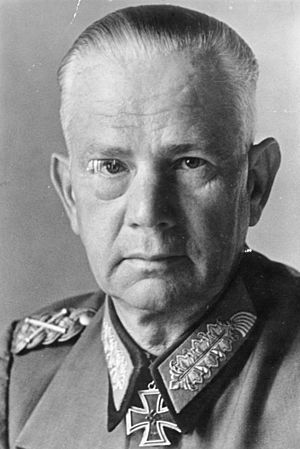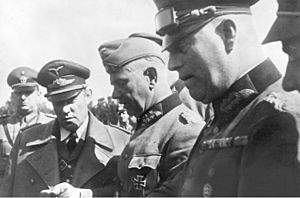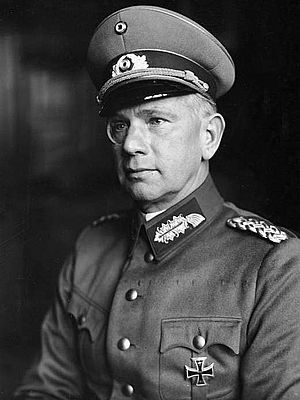Walter von Reichenau facts for kids
Quick facts for kids
Walter von Reichenau
|
|
|---|---|

Reichenau in 1941
|
|
| Born |
Walter Karl Ernst August von Reichenau
8 October 1884 |
| Died | 17 January 1942 (aged 57) Poltava, Soviet Union
|
| Resting place | Invalidenfriedhof, Berlin, Germany |
| Education | Prussian War Academy |
| Years active | 1903–1942 |
| Employer | |
| Organization | |
| Known for |
|
| Title | Generalfeldmarschall |
| Term | 1940–1942 |
| Successor | Fedor von Bock |
| Political party | |
| Movement | Nazism |
| Criminal status | Deceased |
| Spouse(s) | Alexandrine Gräfin Maltzan Freiin zu Wartenberg und Penzlin |
| Parent(s) | Ernst August von Reichenau (father) |
| Awards | Knight's Cross of the Iron Cross Iron Cross 1st Class |
| Allegiance | |
| Motive | Nazism |
| Details | |
| Date | August 21–September 30, 1941 |
| Country | Ukraine |
| Location(s) |
|
| Target(s) | Ukrainian Jews |
| Killed | 33,861 |
| Weapons | Machine gun |
| Military career | |
| Commands held | |
| Battles/wars | |
| Signature | |
 |
|
Walter Karl Ernst August von Reichenau (October 8, 1884 – January 17, 1942) was a high-ranking military leader in Nazi Germany during World War II. He held the rank of field marshal in the German army, known as the Wehrmacht.
Reichenau led the 6th Army during the invasions of Belgium and France. Later, during Operation Barbarossa, the German invasion of the Soviet Union, he continued to command the 6th Army. His troops captured parts of Ukraine and advanced deep into Russia. During this time, he issued a very harsh order that led to terrible events against civilians. His army was involved in the killing of many Jewish people in places like Babi Yar.
Contents
Early Life and Military Career
Walter von Reichenau was born in Karlsruhe in 1884. His father, Ernst August von Reichenau, was a Prussian Lieutenant General. Walter joined the Prussian Army as an artillery officer in 1903.
He attended the Prussian Military Academy and served as a staff officer during World War I. He was promoted to Captain in 1914 and received the Iron Cross award. During the war, he worked in the German General Staff.
Joining the Reichswehr
After World War I, Reichenau joined the Reichswehr, which was Germany's new army. He was promoted several times, becoming a Major in 1924 and a Colonel in 1932.
In 1932, Reichenau met Adolf Hitler. He was very ambitious and saw the Nazi Party as a way to advance his career. He became a strong supporter of the Nazis, which was unusual for many Prussian military officers at the time.
Reichenau became a close ally of Hitler. When Hitler became Chancellor in 1933, Reichenau was promoted to lead the powerful Ministerial Office. This role connected the Army with the Nazi Party. He helped convince Nazi leaders that the power of the SA, a Nazi paramilitary group, needed to be reduced. This led to the "Night of the Long Knives" in 1934, where many SA leaders were killed.
In 1935, Reichenau was promoted to lieutenant general. He was one of Hitler's favorite generals. Hitler wanted him to be the commander-in-chief of the German Army, but other senior generals disagreed.
World War II Campaigns

In September 1939, Reichenau commanded the 10th Army during the German invasion of Poland. He was recognized for his leadership in this campaign.
In 1940, he led the 6th Army during the invasions of Belgium and France. Later that year, Hitler promoted him to Generalfeldmarschall, which is the highest military rank.
Invasion of the Soviet Union
During the German invasion of the Soviet Union in 1941, Reichenau's 6th Army was part of Army Group South. His army captured important cities like Kiev, Belgorod, Kharkov, and Kursk.
Reichenau was known for inspecting Soviet tanks closely. After seeing a T-34 tank, he reportedly said that if the Soviets could produce it in large numbers, Germany would lose the war.
In November 1941, Reichenau was promoted to lead Army Group South. He recommended that Friedrich Paulus, one of his trusted officers, take over command of the 6th Army.
Death
Walter von Reichenau was an active person who enjoyed cross-country running. On January 14, 1942, he suffered a stroke after a run in cold weather. While being flown back to Germany for medical care, his plane crashed during landing in Lemberg. It is not clear if he died from the stroke or from the injuries in the crash. He was replaced by Fedor von Bock and received a state funeral.
See also
 In Spanish: Walter von Reichenau para niños
In Spanish: Walter von Reichenau para niños
 | Janet Taylor Pickett |
 | Synthia Saint James |
 | Howardena Pindell |
 | Faith Ringgold |


